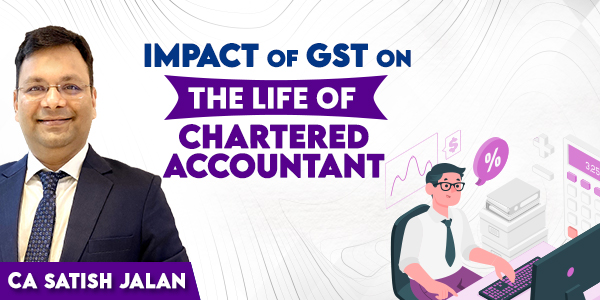04
May, 2023
Impact of GST On the Life of CA
-
CA Satish Jalan
In India, Chartered Accountants play an essential part in implementing the Goods and Services Tax (GST). Their primary responsibility is to educate and assist businesses in complying with the law, not to reduce their tax liabilities. Since the introduction of GST, many firms have been uncomfortable with its requirements and have sought advice from CA professionals.
As a result, the implementation of GST has impacted these professionals' lives, as they are responsible for assisting businesses in navigating this new taxing system amid changes in the world of business.
Table of Contents
- How have VAT and GST changed the roles and responsibilities of the CA?
- What are the Opportunities Available for CA in GST?
What is the Life of CAs After GST?
- Increase in the Number of Clients.
Since the implementation of the Goods and Services Tax (GST), businesses in India have seen benefits as well as drawbacks. Many businesses have struggled to understand how GST applies to their operations and have therefore sought assistance from CAs.
CAs play an important part in educating and advising clients on GST compliance. This is important because, in order to comply with GST, businesses need to understand how it operates. CAs can assist with GST registration, return filing, and GST accounting to help overcome this knowledge gap.
Due to the increased demand for GST-related services, CAs have seen a significant rise in their clientele. This has resulted in an expansion of their overall business.
- A boon for newly qualified accountants in India
The introduction of the Goods and Services Tax (GST) in India has created a once-in-a-lifetime chance for career advancement for newly licensed Chartered Accountants. Because GST is a new system for everyone, experienced and less experienced CAs are on the same playing field.
By taking advantage of this new opportunity, newly licensed CAs can earn essential knowledge and skills in the field of GST. They can gain specialized knowledge in GST compliance, auditing, and consulting services, which are in high demand in the current economy. Furthermore, GST has streamlined the tax system, and CAs knowledgeable about GST can provide valuable guidance to businesses in compliance and tax planning. This might result in additional business opportunities and more clients for newly licensed CAs.
- Increase in Revenue
In addition to GST compliance, chartered accountants in India can provide accounting, registration, return filing, and tax payments. This can lead to an ongoing source of income and the growth of long-term client connections. GST compliance requires frequent attention and provides an ongoing stream of income that can benefit both new and experienced CAs.
- Less Workload
Before the implementation of the Goods and Services Tax (GST) in India, there were numerous indirect taxes such as Excise Tax, Service Tax, VAT, CST, and other taxes and regulations that caused complications for chartered accountants and clients. This complexity resulted in compliance errors, which raised the possibility of unknowingly breaking the law.
With the introduction of GST, this complication has been removed, resulting in better tax governance. Because the central and state governments are required to follow the same law, the workload for the CA community has been significantly reduced, making consulting and compliance work much easier.
How have VAT and GST changed the roles and responsibilities of the CA?
Chartered accountants had to deal with different types and laws in each state under the old VAT system. Completing monthly returns and sales and purchase registers became time-consuming and complicated as a result. With GST, however, everything is done online, and there is only one return that applies to everyone, simplifying the entire process.
GST additionally allows timely data reflection and accuracy in quarterly and yearly returns, decreasing the possibility of errors. Statutory auditors are in charge of supplying accurate information for the GST return and resolving any problems. Chartered accountants are allowed to conduct special audits under GST, making them a one-stop shop for their clients. Overall, GST has simplified and improved the work of CAs, allowing them to grow their operations and better serve their clients.
What are the Opportunities Available for CA in GST?
Training for Entities for Compliance:
Due to the complexity of the GST, businesses may require assistance with compliance. Chartered Accountants could assist in this area by designing relevant business training programs. All critical divisions of a business, such as marketing, retail, and finance/accounting, would need to understand the fundamentals of GST to ensure compliance. By offering the appropriate training, chartered accountants may help ensure a smooth transition.
Assistance During the Transition Period:
Chartered Accountants may be able to assist business entities during the GST implementation process, particularly during the transition period. They could discover applicable credits, modify contracts and agreements, recommend ERP improvements depending on GST regulations, and give vendor training if necessary. Because GST would be fully automated, ERP implementation could be a separate service.
Regular review and compliance assistance:
Compliance will be important for firms to collect GST credits, make tax payments, and claim deductions. CAs may take the opportunity to give businesses frequent reviews and compliance help to ensure correct GST compliance. This could include auditing tax payments and credits, ensuring proper documentation, and assisting with the filing of GST returns.
Business consultant:
With the implementation of GST, CAs can expand their job beyond tax advisors to become total business consultants. They can help with corporate structuring, tax planning, international taxation, and the creation of standard operating procedures. CAs can provide complete assistance to their clients by having a solid understanding of the consequences of GST on business operations.
Dispute avoidance and resolution:
With the implementation of GST, there are always conflicts between taxpayers and tax authorities. CAs could help with dispute avoidance and settlement in such cases by giving professional opinions and guidance, as well as representing clients before appropriate forums or authorities.
In conclusion, the implementation of GST has resulted in significant changes to Chartered Accountants' roles and obligations.
With the implementation of GST, CAs must be well-versed in the new tax regime in order to assist their clients in a variety of areas such as registration, compliance, submitting returns, and so on. Furthermore, CAs can offer value-added services such as business consulting, training, and dispute resolution.
The transition from manual to fully automated processes has made CAs' jobs easier and reduced the time it takes to accomplish tasks. However, the success of the GST regime is largely dependent on the efficient operation of its compliance mechanism, and CAs play a critical role in ensuring compliance for their clients.
Overall, GST has created new opportunities and has become an essential part of their professional lives.
Popular Posts






No Comments